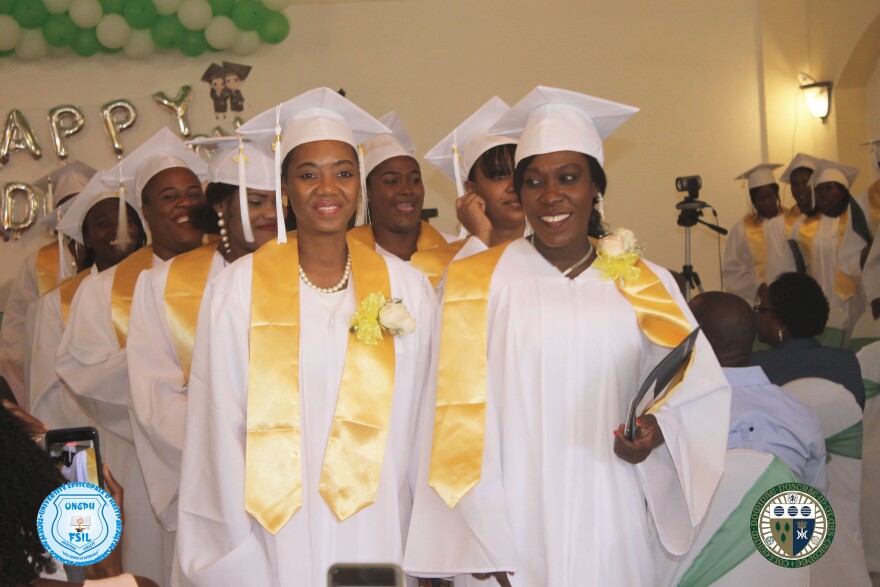Political and civil unrest continues to disrupt life in Haiti. The country has been in crisis since the assassination of President Jovenel Moïse in 2021. Many in the country say resources are limited, especially access to adequate health care. But a western Massachusetts college is seeking to change that.
Professor Anne Mistivar has been teaching a class of about 25 nursing teachers from Haiti, over Zoom, for three years now. She’s been working on a program at Elms College in Chicopee that guides nursing faculty at the Episcopal University of Haiti on the most up-to-date nursing and health care practices.

The class is offered for free through a W.K. Kellogg Foundation grant.
“So today we are going to talk about our nursing philosophy. Bonsoir tout le monde! Aujourd'hui, nous allons parler de la philosophie de l'infirmier," said Mistivar, who translates her lessons in English, Haitian Creole and French.
Mistivar said she wants to wrap up their last day of this course by having each student present their nursing philosophy. One of the students, Louis Gerald Dolce, a nursing science faculty member in Haiti, said he wants to foster a classroom filled with respect and empathy.
“My joy is to see people learn and to contribute even a little to their success,” Dolce said. “Teaching is the best way for me to increase what I already know about a subject, and sharing my knowledge will bring me the greatest good.”
Sometimes, there isn’t a decent internet connection for students in Haiti to access the class virtually. Martha Jean Celus, a nurse faculty student, had some difficulty with her connection. She ended up emailing Mistivar her presentation.

Some students need to walk miles before finding an adequate network, but they do it for this program.
It started back in 2019 and consists of four courses. The first is a 12-week immersive English course, followed by three nurse educator courses focusing on curriculum development, test building and maternal health care.
Nursing faculty members who complete the program gain credits towards their own degree.
Anne-Marie Albano is the co-director of the Haitian nursing program at Elms. She said there are multiple barriers preventing Haitians from obtaining health care on the island. After the assassination of Moïse and a 7.2 magnitude earthquake destroyed homes, schools and hospitals in 2021, Albano said most Haitians aren’t getting essential supplies.
“They don't get food, they don't get water, they don't get Internet access. They don't get, you know, so many different things. Fuel is the big thing,” Albano said.
Albano said many of the smaller hospitals in Haiti have not been able to stay open long enough because of the low fuel supply.
Harry Dumay, president of Elms, and from Haiti himself, helped start the program.
“It's really a small impact and given the magnitude of the needs, but it is an impact nonetheless,” Dumay said.
Dumay acknowledges the program may not remedy the lack of access to hospitals, but said this program will help.
“The impact that we can have will be on the preparation of nurses," Dumay said, "so that we can elevate the level of care that nurses provide in those regions where they can work."
Fabiola Docteur is thinking broader than that. A graduate of the Elms program, Docteur said she and her students travel to rural, mountainous areas of Haiti without hospitals to give pregnant women checkups.

“When we do mobile clinics, we educate those women. We talk to them. We give them medicine. But we can't go every day or every week or every month. Sometimes we go every six months to help them. We know that they should have someone to evaluate them every month," Docteur said. "Sometimes it's not easy."
Docteur said they give the women their contact information, so at the very least they can call them if they have questions or concerns.
Docteur said she hopes, one day, to have a clinic in the mountainous regions and provide health care for all.
“If I have the opportunity in future, I want to go where there is no hospital, there is no personal health,” Docteur said. “I can go and give work to some nurses. We can do something for these people because we know that they need help.”
It’s a big plan, she said. But if there’s a need, she wants to be there to fill it.



